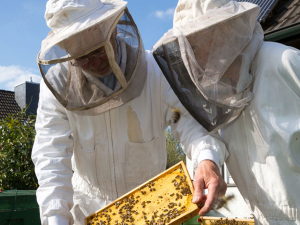Planting to feed the bees
The Ministry for Primary Industries (MPI) have released a handbook offering guidance on how to plant strategically to feed bees.
 Supermarkets have cut the price paid to suppliers, but haven’t cut the price on the shop shelf, claims Lorimer.
Supermarkets have cut the price paid to suppliers, but haven’t cut the price on the shop shelf, claims Lorimer.
Supermarkets have put the squeeze on beekeepers who supply them, claims Jane Lorimer, NZ Beekeeping president.
They have cut the price paid to suppliers, but haven’t cut the price on the shop shelf. So consumers still see honey as really expensive.
“We have cut back but the supermarkets are making more money out of their product. We definitely had the squeeze put on us ‘drop your price or you are out’.”
Head of corporate affairs, Foodstuffs NZ, Antoinette Laird, told Rural News there is currently an over-supply of non-manuka honey varieties in the market which has softened retail prices.
“This is great for shoppers who benefit as honey prices drop - but we do recognise this common supply and demand outcome challenges the supplier community,” she says.
“Last year 500g of Pams Clover Creamed Honey retailed at $12.49 and today costs $6.99 at New World, while Airborne Honey Liquid 500g, which retailed $12.19 in 2019 is now on-shelf at $7.99 – making New Zealand produced honey a very affordable option for more of our customers.”
A Countdown supermarket spokesperson told Rural News the price of honey spiked a couple of years ago and it’s now coming back down due to the changed manuka regulations and an over-supply of clover and blended honeys.
“Our honey prices have dropped about 15% in the last year. Previously the high honey prices meant it was becoming too expensive for customers to choose honey as a spread or ingredient, but we’re starting to see honey sales pick up again now that it’s more affordable for customers.”
The World Wide Sires National All Day Breeds Best Youth Camp Best All Rounder plaudit has become family affair, with 2026 Paramount Cup winner Holly Williams following in her sister Zara's footsteps.
DairyNZ is giving New Zealand farmers a unique opportunity to gain hands-on governance and leadership experience within the dairy sector.
Herd improvement company LIC has posted a 5.2% lift in half-year revenue, thanks to increasing demand for genetics.
According to the latest Fresh Produce Trend Report from United Fresh, 2026 will be a year where fruit and vegetables are shaped by cost pressures, rapid digital adoption, and a renewed focus on wellbeing at home.
The Roar is a highlight of the game hunting calendar in New Zealand, with thousands of hunters set to head for the hills to hunt male stags during March and April.
OPINION: The past few weeks have been tough on farms across the North Island: floods and storms have caused damage and disruption to families and businesses.

OPINION: Meanwhile, red blooded Northland politician Matua Shane Jones has provided one of the most telling quotes of the year…
OPINION: This old mutt has been around for a few years now and it seems these ‘once in 100-year’ weather…